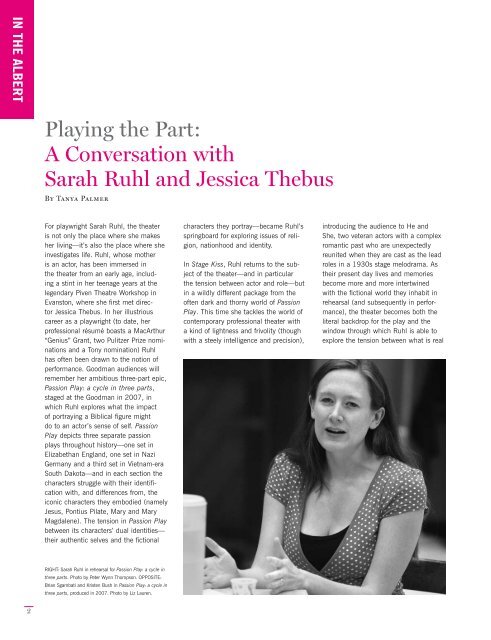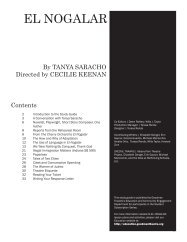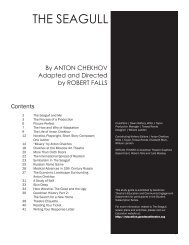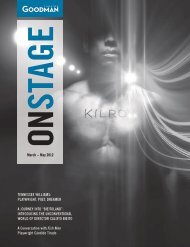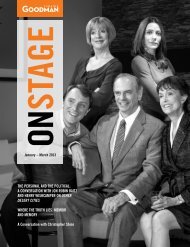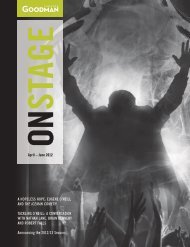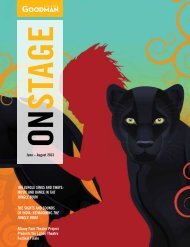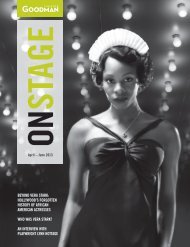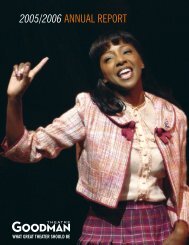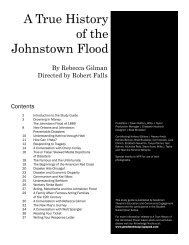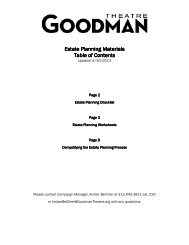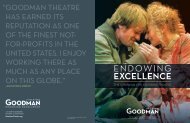Stage Kiss - Goodman Theatre
Stage Kiss - Goodman Theatre
Stage Kiss - Goodman Theatre
You also want an ePaper? Increase the reach of your titles
YUMPU automatically turns print PDFs into web optimized ePapers that Google loves.
IN THE ALBERT<br />
Playing the Part:<br />
A Conversation with<br />
Sarah Ruhl and Jessica Thebus<br />
By Tanya Palmer<br />
For playwright Sarah Ruhl, the theater<br />
is not only the place where she makes<br />
her living—it’s also the place where she<br />
investigates life. Ruhl, whose mother<br />
is an actor, has been immersed in<br />
the theater from an early age, including<br />
a stint in her teenage years at the<br />
legendary Piven <strong>Theatre</strong> Workshop in<br />
Evanston, where she first met director<br />
Jessica Thebus. In her illustrious<br />
career as a playwright (to date, her<br />
professional résumé boasts a MacArthur<br />
“Genius” Grant, two Pulitzer Prize nominations<br />
and a Tony nomination) Ruhl<br />
has often been drawn to the notion of<br />
performance. <strong>Goodman</strong> audiences will<br />
remember her ambitious three-part epic,<br />
Passion Play: a cycle in three parts,<br />
staged at the <strong>Goodman</strong> in 2007, in<br />
which Ruhl explores what the impact<br />
of portraying a Biblical figure might<br />
do to an actor’s sense of self. Passion<br />
Play depicts three separate passion<br />
plays throughout history—one set in<br />
Elizabethan England, one set in Nazi<br />
Germany and a third set in Vietnam-era<br />
South Dakota—and in each section the<br />
characters struggle with their identification<br />
with, and differences from, the<br />
iconic characters they embodied (namely<br />
Jesus, Pontius Pilate, Mary and Mary<br />
Magdalene). The tension in Passion Play<br />
between its characters’ dual identities—<br />
their authentic selves and the fictional<br />
characters they portray—became Ruhl’s<br />
springboard for exploring issues of religion,<br />
nationhood and identity.<br />
In <strong>Stage</strong> <strong>Kiss</strong>, Ruhl returns to the subject<br />
of the theater—and in particular<br />
the tension between actor and role—but<br />
in a wildly different package from the<br />
often dark and thorny world of Passion<br />
Play. This time she tackles the world of<br />
contemporary professional theater with<br />
a kind of lightness and frivolity (though<br />
with a steely intelligence and precision),<br />
introducing the audience to He and<br />
She, two veteran actors with a complex<br />
romantic past who are unexpectedly<br />
reunited when they are cast as the lead<br />
roles in a 1930s stage melodrama. As<br />
their present day lives and memories<br />
become more and more intertwined<br />
with the fictional world they inhabit in<br />
rehearsal (and subsequently in performance),<br />
the theater becomes both the<br />
literal backdrop for the play and the<br />
window through which Ruhl is able to<br />
explore the tension between what is real<br />
RIGHT: Sarah Ruhl in rehearsal for Passion Play: a cycle in<br />
three parts. Photo by Peter Wynn Thompson. OPPOSITE:<br />
Brian Sgambati and Kristen Bush in Passion Play: a cycle in<br />
three parts, produced in 2007. Photo by Liz Lauren.<br />
2


